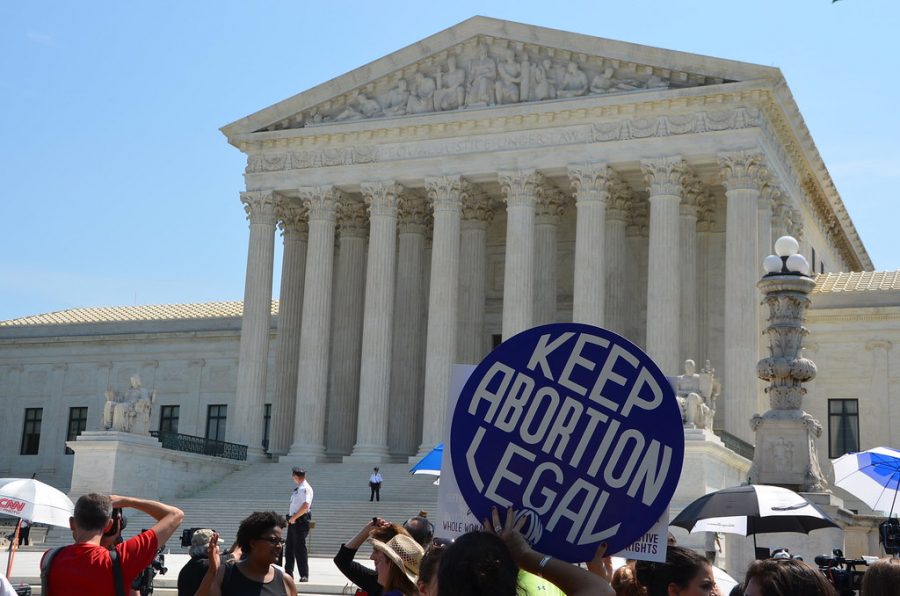The Texas Abortion Ban: What Does It Mean?
Protestors outside of the Supreme Court building fight to keep abortion legal
The Texas government has banned abortion without actually banning abortion.
How? Simple. They made getting an abortion a complete disadvantage in every way possible and a total advantage for random people who want to sue them for it on countless technicalities, making thousands of pregnant Texans lose their constitutionally-protected access to abortion.
The law now dramatically expands the entire concept of a civil lawsuit, relying on the initiative of private citizens instead of the government. Abortion patients themselves can’t be sued, but anyone who performs or aids with the abortion — their doctor, an Uber driver, or even their family members — can be sued by quite literally everyone.
The law itself is aimed at preventing providers of abortions from using Roe v. Wade’s constitutional right to an abortion as justification in court.
Not only that, but there are several provisions that incentivize plaintiffs to file dozens upon dozens of cases. If successful in their suit, plaintiffs will receive a $10,000 cash reward, along with the protection of the law to sue as many people as possible without legal fees, making them ‘modern day bounty hunters’ as said by Supreme Court Justice Sonia Sotomayor.
What’s even more radical is that you can sue regardless of whether harm was done to the plaintiff personally. Meaning, you could be a total stranger to the defendant and still have standing in the case.
This results from an emerging Republican influence within state governments, as they find it difficult to prohibit things they dislike constitutionally. If the constitutionally-driven Republican Party will go beyond the Constitution for their own personal gain, then where do their “morals” really stand?
Not only are the plaintiffs incentivized to sue, but defendants have no protection from multiple lawsuits for the same abortion. Fortunately, a court can’t collect relief for the same abortion more than once, but nonetheless the prodecure incurs an abundance of time and money. With that, the court can’t award costs or attorney fees back to the defendant, even if they successfully win the lawsuit. This slants the law in the plaintiffs favor since they are able to recoup their costs and attorney fees in addition to the cash reward provided to them.
A plaintiff can bring hundreds of lawsuits against several different clinics all the way across Texas with the same allegations and lose the first case, but the other providers being sued under that same charge can’t rely on that case to stop the litigation/use of it as a defense since every case is considered a fresh start in court.
They also have heavily restricted other defenses you can use in court. For instance, you can’t argue your belief of the unconstitutionality of the law itself. However, barring the defense of unconstitutionality would be difficult to enforce, since that’s why the defendant provided the abortion in the first place.
All of these rules are generally technicalities to make any type of defense by the defendant impossible, giving them almost no grounds to defend themselves, making it more of an angry mob with pitchforks and torches than a fair trial.
Thankfully, sexual assult assailants cannot sue over an abortion provided to that survivor of rape, but this does not do much, since RAINN, citing a U.S. Justice Department survey released in 2020, said 310 out of every 10,000 rapes are reported to police. That’s about a third. Of those 310, just 50 lead to arrest, leading to just 25 out of 1,000 rapes resulting in incarceration. That’s 2.5% of all rapes nationally. Plus, an IDVSA study from the University of Texas reported that more than 90 percent of sexual assault cases in Texas are never reported, and for the states to identify rapists, victims have to come forward, which clearly isn’t probable.
This makes the whole ordeal even more complicated because rapists not being able to sue providers could only really be enforced with the sliver of rapists actually convicted, making it another he-said-she-said argument on what occurred. Along with that, the law doesn’t prevent other people from suing that same case, even if that pregnancy resulted from a rape or incest.
President Biden said that his administration is committed to protecting and defending the right established nearly five decades ago. They have challenged the statute of the law and reversed the 2018 decision by Trump that disallowed family planning clinics from receiving federal funding if they provide abortion referrals.
As for now, a suit has since been filed by Planned Parenthood, asking the court to declare the abortion law unconstitutional. A hearing was scheduled, but the panel of judges has held off on the proceedings.
Abortion providers, women’s rights groups, doctors, and even the U.S. Government is partaking in the battle to overturn the law in federal courts. Hopefully, this fight won’t expand farther than it already has. Only time will tell how this human rights brigade will turn out for the state of Texas.







